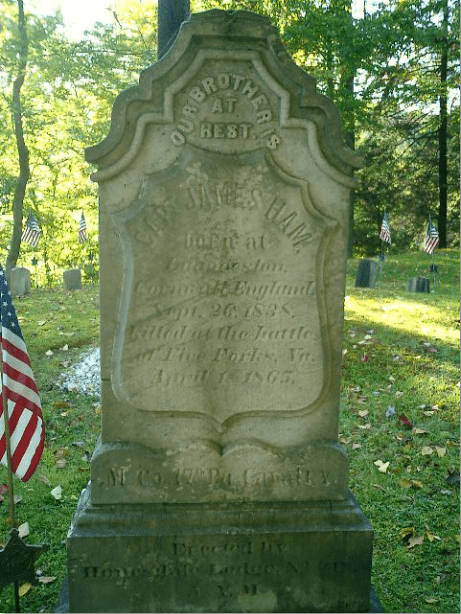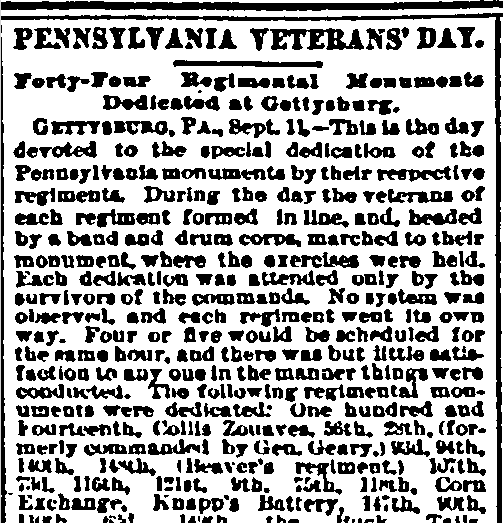Introduction: In this article, Scott Phillips researches old newspapers to find stories about his Civil War cousin, Captain James Ham, who was mortally wounded at the Battle of Five Forks just as the war was drawing to a close. Scott is a genealogical historian and owner of Onward To Our Past® genealogy services.
Earlier this month (July 1-3) our nation commemorated the 150th anniversary of the Battle of Gettysburg. I well recall the awe I felt when, as a youngster, my family and I visited those hallowed grounds during the centennial of the Civil War back in 1963. That experience was the one that sparked my deep interest in American Civil War history, which continues to this day.
As pure luck would have it, while I was enjoying all the recent publicity regarding the 150th anniversary of the Battle of Gettysburg, I happened to make the discovery of a cousin in my ancestry, James Ham, who was a veteran of the Civil War.

James was born in Launceston, Cornwall, in the United Kingdom. I discovered that after running into trouble with the law for “assaulting an officer in the execution of his duties” and receiving a 12-month sentence, he emigrated from Cornwall. It wasn’t long before I found that he established himself in Wayne County, Pennsylvania.
As I was following his listing from the 1860 U.S. Census, I also came upon the fact that James Ham served in the Civil War. He rose to the rank of captain in the Pennsylvania 17th Cavalry, in their M Company. It was very enjoyable to find, while searching the historical newspapers in GenealogyBank.com, an article from an 1889 Maryland newspaper reporting on the dedication of a monument at Gettysburg to “my” Captain Ham’s regiment, with a description of the huge crowds that attended this event.

The more I followed my leads, the more I was able to improve my understanding of the life, and unfortunate death, of my Civil War ancestor. It wasn’t long before I came upon the fact that Captain Ham was wounded in Virginia at the Battle of Five Forks on April 1, 1865, and died from those battle wounds on April 5, 1865. Now, as much as I like to think I know a lot about the Civil War, I was not familiar with the Battle of Five Forks—so I turned again to research the historical newspapers in GenealogyBank.com.
This time there were hundreds of old newspaper articles for me to pick from. My knowledge was really expanded by reading an impressive article from an 1865 Wisconsin newspaper. This was a very detailed account of the battle, and the reporter wrote paragraph after paragraph that put me right in the action of many of the cavalry charges.
Shortly thereafter I found an article in a 1908 Idaho newspaper that would make any genealogist’s and/or historian’s heart jump. This old news article contains a story of family letters, history, a dash of good luck, and perseverance in the discovery of the fate of the battle flag carried for a time by Union General Sheridan during the battle.
Then my attention was captured by an article published in an 1880 New York newspaper which reported that General Sheridan was being called to court in order to explain why he relieved General Warren of his command after the Battle of Five Forks. The subheading really caught my eye: “Eight Days Previous to the Surrender at Appomattox.” I had read the date of death of my ancestor but I had not, until that point, realized that he was killed in action only days before the Civil War ended.
I am now in the second phase of seeking even more information about this Civil War ancestor as I have placed a research request with the Wayne County (Pennsylvania) Historical Society (http://waynehistorypa.org). One of their researchers is hard at work hopefully finding more clues, data, and details about Captain James Ham and his family. Plus after my very first conversation with the researcher, I have been “forced” to place Wayne County, Pennsylvania, on my “Genealogy Must-Visit List” since the researcher casually mentioned to me that the Museum holds dozens of personal letters written from Captain Ham back to his wife and family during the Civil War!
I think I better start packing right now. I figure at least two days reading for sure! Can you imagine what those letters might hold?
Do you have comparable success stories about researching your Civil War ancestor? Tell us about them in the comments section.